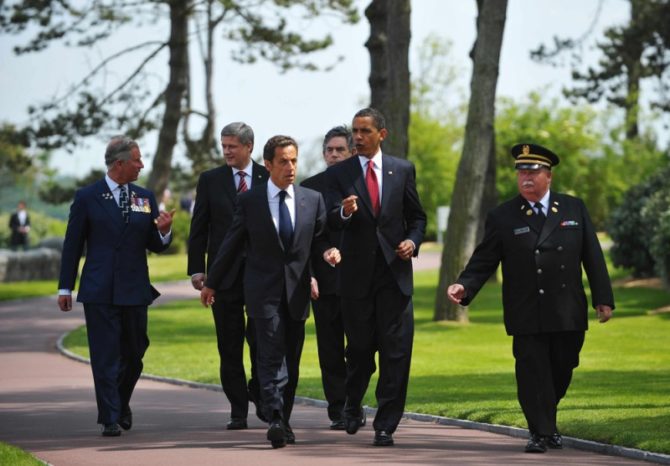Elections & Eloquence

Was it gloating, or just relief, as Nicolas Sarkozy’s lieutenants commented on the results of the European elections? The president’s party captured 28 percent of the votes cast by the French in the election for the European Parliament. Just over a quarter, not even a third, but there was enough relief in the outcome that it could be spun into gloatability because it was the largest chunk won by any of the parties in a highly fractionalized race.
Even in a voter turnout that set an American-style record for indifference-only 40 percent cast their ballots-the result gave the Union for a Popular Movement (UMP) 29 out of the 72 seats apportioned to France in the parliament. If not a resounding victory for Sarkozy, the outcome was a resounding defeat for the opposition Socialist Party. The Left’s commentariat, struggling to find a positive spin for the dismal outcome, turned to the big picture: the combined vote for the Left was greater than the grand total for the Right.
The result in France was generally reflected across the European Union, whose voters filled the 785 seats in the Strasbourg-based legislative branch of the EU. The parliament’s power has grown significantly over the years as it now adopts or rejects laws affecting residents of the 27 member countries.
In France, several lessons could be drawn from the outcome. Most notably, support for les Verts, the ecology movement, matched the Socialists’ 16 percent. The Greens ran especially strong in Paris and other urban centers, which led to suggestions that it was a “bobo vote”, bohemian and bourgeois. That’s an ironic characterization of a party that rallied around Daniel Cohn-Bendit, a political showman who was a leader of the protesters hurling paving stones in the May 1968 student revolution. Danny the Red, as he was known then-a reference to his politics and his hair-is still a force to be reckoned with from the power bases he maintains in both France and Germany.
Left and Center
For the Socialists, the outcome was another blow to their seriously weakened party. In her brief tenure as its first secretary Martine Aubry has made no headway in reshaping the party into electability. The PS still has not found its footing, not even with the help of the economic crisis and an unloved president.
A third lesson is the continuing decline of François Bayrou as a national political figure. His centrist MoDem-for Mouvement Démocrate-is apparently better at writing cyber-smart abbreviations than at persuading voters. In the interest of good politics, that’s too bad, because Bayrou has long demonstrated integrity and ability-just not at capturing ballots. For all his quiet competence, Bayrou lacks the charisma that could deliver a majority.
The truly resounding message of the election is disaffection. The idea of Europe is not only remote from ordinary French life but also increasingly suspect. In the provinces “Brussels” now outranks “Paris” as a curse of overregulation or worse. In Provence, where the crisp, delicious Tavel, Bandol and other rosé wines define summer as much as the cicada’s rasp, the latest outrage was the EU proposal to allow blends of red and white wine to be called rosé. The idea wasn’t accepted, but that the idea was seriously entertained didn’t help the EU’s reputation.
But that’s a footnote. The more telling criticism is that “Brussels,” as shorthand for the EU, has spun its wheels rather than help to solve the financial crisis. Leadership in recovery efforts has come from national leaders pressing national agendas.
The UMP’s ticket in the June 7 EU vote was led by Michel Barnier, Minister of Agriculture. No. 2 on the ticket was the redoubtable Rachida Dati, the young Minister of Justice who was pushed out of that prestigious post for being too controversial.
With those two senior jobs open, a cabinet realignment is coming up soon. With the appointments Sarkozy will try to strengthen his position for the regional elections next year and the presidential race in 2012. Before the latest election the buzz foretold more moves toward ouverture, appointments from the Center and the Left that would give the UMP broader appeal. But after the rout on June 7, the need for more ouverture has disappeared.
One Shining Moment
Four leaders spoke at Omaha Beach on June 6, the 65th anniversary of the D-Day landings. But all frequencies were tuned to the fourth, Barack Obama. His eloquence is unmatched among those who currently command that sort of microphone, and his message at that place, consecrated by the lives lost to freedom’s cause, reached eager ears. But Sarkozy’s speech was also eloquent. Passion comes easy for Sarkozy, perhaps, but even so, I for one was moved by his emphatic recognition of the role played by the Allies in liberating France and Europe, and his unstinting praise for the American role in both World Wars and afterwards. It will be interesting to see if his political foes attack Sarko l’Américain for what he said there.
Originally published in the July/August 2009 issue of France Today.
Share to: Facebook Twitter LinkedIn Email



